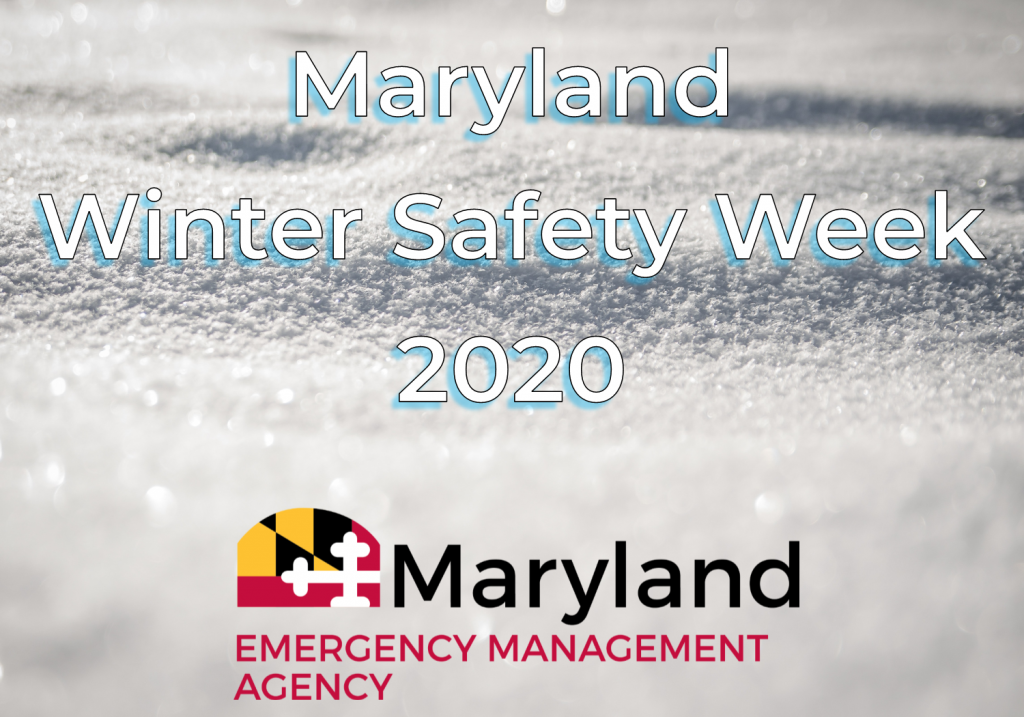Second Annual Maryland Winter Safety Week Begins
MEMA, FEMA, National Weather Service, State Agencies Partner to Increase Public’s Awareness of Winter Hazards |
 |
REISTERSTOWN, Md. (December 7, 2020) —As the winter season begins with the pandemic affecting our day-to-day activities, the Maryland Emergency Management Agency (MEMA) is joining with state, local and federal partners to encourage all Marylanders to learn more about winter safety and the importance of winter emergency preparedness in the COVID-19 era. The 2nd Annual Maryland Winter Safety Week runs from December 7 through December 13, 2020.
“Our administration, with our partners of the Maryland Emergency Management Agency, the Maryland State Highway Administration, the Maryland State Police, the Maryland Department of Health, and the National Weather Service are working together to bring awareness to all Marylanders about winter safety,” said Governor Larry Hogan. “This year, due to the ongoing COVID-19 pandemic, it is more important than ever to navigate this winter season safely.”
Throughout the week MEMA will be sharing information on their social platforms, including recorded videos from Governor Hogan, the Maryland Office of the State Fire Marshal, and a live video discussion with MEMA and the National Weather Service.
“Now is not the time to let our guard down,” said Russ Strickland, MEMA’s Executive Director. “Winter season brings with it several hazards that cost injuries, lives, and money every year, but 2020 is different. COVID-19 makes everything more complicated on top of other considerations to be taken during the cold months. We are all exhausted by this pandemic, but it is precisely because of it that we must take winter safety precautions seriously.”
This year, MEMA urges all Marylanders to take extra precautions because of COVID-19 and to follow all recommendations from the Maryland Department of Health (MDH) and Centers for Disease Control and Prevention (CDC) regarding face coverings, distancing, and hygiene practices. When possible, go outside for fresh air and exercise. Make sure to have pandemic supplies like extra face coverings, hand sanitizer, and disinfectant as part of you supply kits in both your home and car.
Among the several hazards that winter weather brings are the health risks posed by sustained exposure to extreme cold. It can lower body temperature, weakening the immune system, and it can aggravate chronic diseases like asthma, arthritis, diabetes, cardiovascular and lung disease, and mental illness, among others. A 2014 report from the CDC stated that of the nearly 11,000 weather-related deaths reported nationally between 2006 and 2010, 63 percent were attributable to excessive natural cold.
Thousands of people are also at risk indoors if their power has been shut off, or they do not have the financial means to increase the temperature in their home. For those with chronic diseases, a cold interior may be a dangerous environment. Cases of carbon monoxide exposure peak during the winter, when people are more likely to use generators, stoves, and home heating systems that may not be properly maintained. If it is unsafe to run a gas lawnmower or a car in a given space, it is also unsafe to run a portable generator.
MEMA and other state partners have gathered a number of winter preparedness and safety tips that will be shared throughout Maryland Winter Safety Week and the winter season through our social media channels. Here are some of the highlights:
- When cold weather hits, you should check on the welfare of family, friends, and neighbors who are particularly vulnerable to cold, snow, and ice – this may include the elderly and those with access and functional needs.
- Certain fire hazards are common during the winter. The Office of the State Fire Marshall reminds you to practice safety when heating your home or workplace, be cautious when cooking, and make sure holiday lights and decorations are used properly.
- Build a home preparedness kit that includes winter supplies such as snow shovels, ice melting products, extra warm clothes and blankets, flashlights, and batteries. Also include extra COVID-19 supplies.
- Follow a trusted weather source, such as the National Weather Service and local news media, to be aware of any predicted frozen precipitation or severe cold temperatures.
- Visit Ready.gov/alerts for more information on emergency alert options.
- The Maryland Department of Transportation State Highway Administration offers these tips for safe winter driving.
- Make sure your vehicle is ready for winter travel
- Check and winterize your vehicle, including all fluids, wiper blades, lights, and systems before the winter season begins.
- Have a car emergency kit in your vehicle, and add some COVID-19 supplies.
- Having a car emergency kit can be the difference between surviving being stranded in a severe winter storm or blizzard and getting frostbite, or worse, dying.
- Keep your gas tank near full to avoid ice in the tank and fuel lines.
- Identify your pet with up-to-date name tags and rabies tags; include your cell phone number on the tag. Or, your pet can be microchipped, and most vets or animal control agencies can scan the chip to help locate the owner.
- Insulate your home by installing storm windows or covering windows with plastic from the inside to keep cold air out.
- Leave the heat on in your home and set the thermostat to no lower than 50° Fahrenheit If you will be going away during cold weather.
- Consider using battery-operated flameless candles. They look and smell real!
Additional information about winter preparedness can be found on our website (www.mema.maryland.gov), our Twitter feed, our Facebook page, our LinkedIn page and our YouTube site.
NOTE TO MEDIA: MEMA staff members are available for interviews about winter storm and emergency preparedness.
###
CONTACT:
Jorge Castillo, jorge.castillo@maryland.gov, 443-381-3518
Ed McDonough, ed.mcdonough@maryland.gov, 410-446-3333
24/7 line: 877-636-2872
